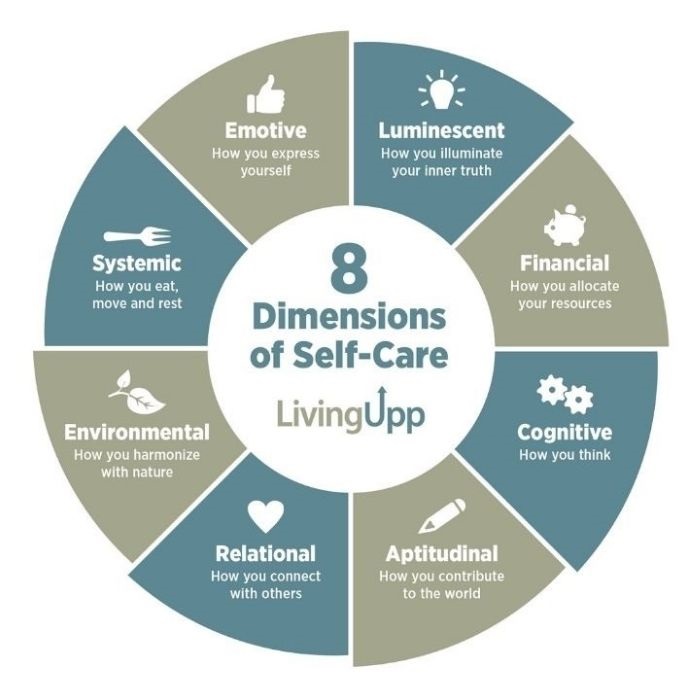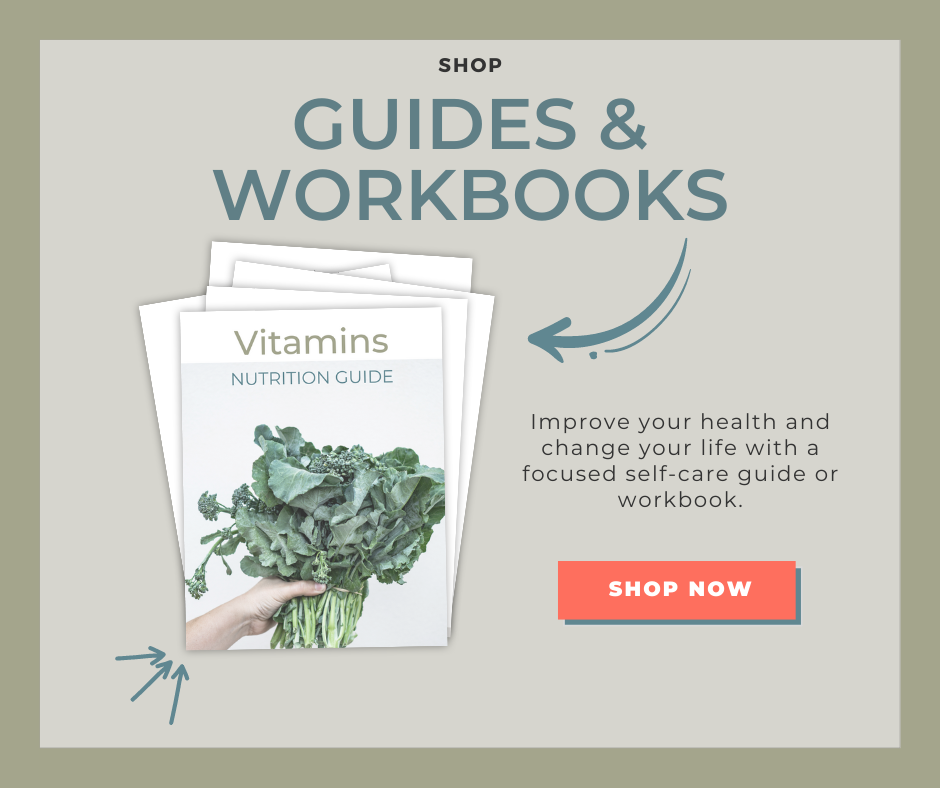Self-care is deeply personal and opinions vary about what it is and isn’t. What it is to you may not be true for someone else. Put simply, self-care is everything you do to support your well-being between doctor’s appointments. This article explores the origins of self-care and attempts to answer the question: what is self-care?
LivingUpp is a participant in affiliate programs, which means we may earn a small commission from qualifying purchases on links to Amazon and other sites at no additional cost to you.
Self-Care: An Evolving Movement
Self-care is an ever-evolving movement. As a registered dietitian with more than two decades of experience in health care, I’ve watched with excitement as the interest in this area has grown.
More people are seeing the value of investing time, money, and energy into caring for themselves. And for good reason. It’s clear that self-care is an effective preventive healthcare tool. It’s practical, affordable, and you can use it daily to support a healthy lifestyle.
A Brief History of Self-Care Definitions
While the notion of self-care has been around for decades, modern concepts of self-care began to take shape in the 1980’s.
According to the World Health Organization (WHO), self-care is “the most dominant form of primary care in both developed and in developing countries.” By some estimates, 65% to 85% of all health-related care is performed by individuals, without professionalized care.
Here’s a compiled list of some of the most significant definitions for self-care since 1983:
World Health Organization, 1983
“Self-care in health refers to the activities individuals, families and communities undertake with the intention of enhancing health, preventing disease, limiting illness, and restoring health. These activities are derived from knowledge and skills from the pool of both professional and lay experience. They are undertaken by lay people on their own behalf, either separately or in participative collaboration with professionals.”
The Role of the Pharmacist in Self-Care and Self-Medication, 1998
“Self-care is what people do for themselves to establish and maintain health, and to prevent and deal with illness. It is a broad concept encompassing hygiene (general and personal); nutrition (type and quality of food eaten); lifestyle (sporting activities, leisure etc.); environmental factors (living conditions, social habits, etc.); socioeconomic factors (income level, cultural beliefs, etc.); self-medication.”
World Health Organization, 2009
“Self-care is a deliberate action that individuals, family members and the community should engage in to maintain good health. Self-care is the ability of individuals, families and communities to promote health, prevent disease, and maintain health and to cope with illness and disability with or without the support of a health-care provider.”
Mosby’s Medical Dictionary, 8th Ed., 2008
“The personal and medical care performed by the patient, usually in collaboration with and after instruction by a health care professional.”
Role of community pharmacists in patients’ self-care and self-medication, 2015
“Fundamentally, the concept “self-care” puts responsibility on individuals for their own health and well-being. Many authors attempt to describe what self-care, and whilst no universally agreed definition exists, it is clear that self-care is seen as a broad concept that encompasses activities to establish and maintain health, through to preventing ill health.”
Global Access Partners (Australia), 2015
“The activities people undertake to stay fit and maintain good physical and mental health, prevent illness and accidents and avoid unnecessary risks. It includes self-medication for minor ailments and chronic conditions and actions taken to recover after acute illness or discharge from hospital. Responsible self care requires good health literacy and communication with health professionals including pharmacists and GPs.”
Department of Health (UK)2016
“The actions individuals take for themselves, their children, their families and others to stay fit and maintain good physical and mental health; meet social and psychological needs; prevent illness or accidents; care for minor ailments and longer term conditions; and maintain health and wellbeing after an acute illness or discharge form hospital.”
Most of the proposed definitions of self-care above do share some common characteristics, though.
10 Key Characteristics of Self-Care
Here are 10 key characteristics that most self-care strategies share:
- It’s positive: Self-care has a positive effect on your health.
- It’s personal: You can personalize it to target your specific needs and priorities.
- It’s Multidimensional: You must support all key areas of your life to achieve a state of wellness.
- It’s Collaborative: Self-care isn’t a solo gig. It’s a collaborative effort that impacts your life and the lives of others.
- It’s a Process: Self-care isn’t a one-and-done activity. It’s a process. It takes time to identify which self-care strategies are effective and which ones are not.
- It May or May Not Be Radical: For some people, self-care feels carefully orchestrated and structured. For others it’s more subtle. It doesn’t have to be radical to support your health.
- It Builds Trust: The overarching goal of self-care is to reconnect you with your intuition. When you trust yourself to recognize what you need, you can choose specific strategies that align with your needs.
- It Fosters Self-Confidence: People who practice self-care regularly are more confident in their abilities to self-manage their health.
- It’s is Flexible: Self-care isn’t rigid. There are no rules for when, where, or how you must practice it. It’s flexible and you can easily integrated it into any lifestyle, circumstances, or environments.
- It’s Empowering: Self-care is an active endeavor. Unlike traditional health care, which has historically been a passive experience, it requires action.
A Unified Definition of Self-Care
While a unified definition of self-care does not yet exist, LivingUpp proposes this:
Self-care is a form of preventive health care that includes all the actions you take to improve, restore, or maintain your health. Simply put, self-care is everything you do to between doctor’s visits to support your health.
The 8 Dimensions of Self-Care Framework
LivingUpp’s 8-dimensional framework helps widen the lens on self-care. By looking at each of the eight key areas of your life as individual parts, you’ll begin to see a clearer picture of your well-being as a whole. And as you carefully examine your day-to-day habits within each of these areas, you’ll learn how to identify your needs and priorities more easily.

The 8 Dimensions of Self-Care framework makes it easy to identify and prioritize the areas of your life that need attention. Using this framework, you can invest your time, energy, and other resources more effectively and efficiently.
Here’s a quick overview of the 8 Dimensions:
- The Systemic Dimension: How you eat, move and rest
- The Emotive Dimension: How you express yourself
- The Luminescent Dimension: How you illuminate your inner truth
- The Financial Dimension: How you allocate your resources
- The Cognitive Dimension: How you think
- The Aptitudinal Dimension: How you contribute to the world
- The Relational Dimension: How you connect with others
- The Environmental Dimension: How you harmonize with nature
Hint: The first letter of each dimension spells the acronym “self-care” to help you remember them.
From Passive Recipients to Active Participants
The truth is most people are passive recipients of health care. They become ill and seek treatment from the healthcare system. Eventually, they recover but go right back to the same habits that made them sick to begin with. And the cycle continues until they fall ill again.
And the cycle continues.
Taking a more active role in your health means becoming the director of your healthcare team.
If you’re looking to bring self-care into your daily life, the Lifestyle Design Planner incorporates the 8-dimensional framework and Rate Your 8 assessment tool into its daily planning pages. With the right tools, prioritizing and planning your self-care rituals is simple.
Self-Care is Health Care
Self-care isn’t a replacement for health care. It is health care.
The intent of self-care isn’t to eliminate the need for professionalized healthcare. Even the healthiest people require medical care from time to time. The real goal is to carefully curate a collection of strategies that support your well-being—so you can reduce your dependency on the health care system.
After all, health care providers are meant to be consultants. Their role is to offer guidance and provide you with recommendations for treatments. Your role is to decide which treatment option is right for you.
Self-care is changing the way we view and deliver health care. As more people take their rightful place as the directors of their health care journey, the way we care for ourselves will continue to evolve over time.
What is self-care? The only definition of self-care that really matters is the one you choose for yourself.

Information on this website should not be interpreted as providing or replacing medical advice, diagnosis, or treatment. All content is intended for adults over the age of 18. LivingUpp is a participant in affiliate programs, which means we may earn a small commission from qualifying purchases on links to Amazon and other sites at no additional cost to you.
